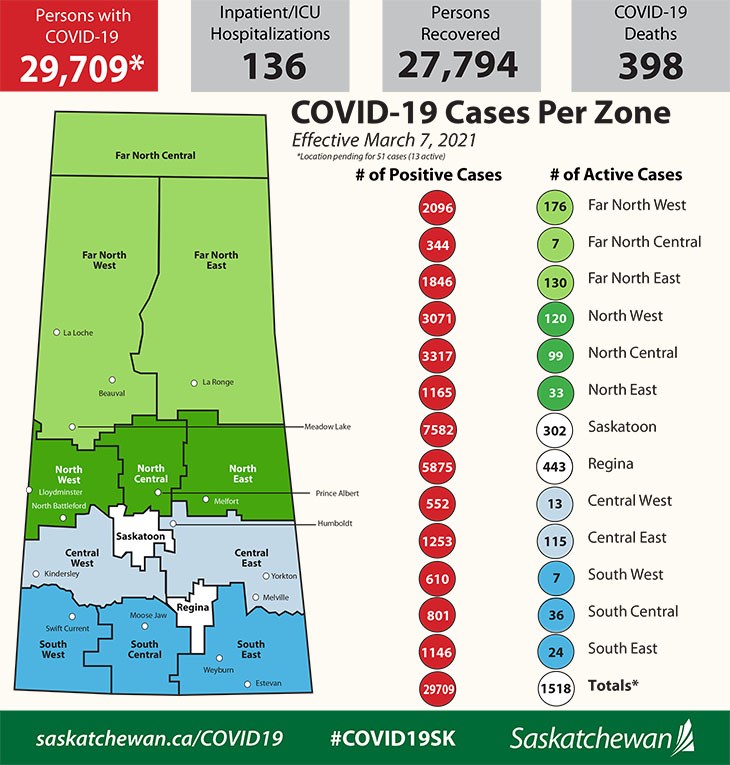There are 116 new cases of COVID-19 to report in Saskatchewan on March 7, bringing the provincial total to 29,709 cases. There are no new cases of COVID in the Weyburn area, with two active cases currently, and 24 active cases for the southeast region.
Two Saskatchewan residents who tested positive for COVID-19 have died. One death was reported in the 40-49 age group from the Far North West zone and one death was reported in the 19 and under age group from the Northwest zone.
The new cases are located in the Far North West (6), Far North Central (1), Far North East (3), Northwest (6), North Central (8), Saskatoon (19), Central West (2), Central East (8), Regina (50), Southwest (2), South Central (5) and Southeast (6) zones. One case with pending residence information was assigned to the Regina zone.
There are a total of 27,793 recoveries, with 209 new recoveries as of March 7, and 1,518 cases are considered active.
There are 136 people in hospital, with 114 people receiving inpatient care: Far North West (3), Far North East (1), Northwest (11), North Central (10), Northeast (1), Saskatoon (50), Central East (3), Regina (33) and Southeast (2). Twenty-two people are in intensive care: North Central (1), Saskatoon (11), Central East (1) and Regina (9).
Vaccines Reported
An additional 1,428 doses of COVID-19 vaccine have been given in Saskatchewan, bringing the total number of vaccines administered in the province to 91,884.
The 1,428 doses of COVID-19 vaccine reported for March 7 were administered in the following regions: Northwest (388), North Central (226), Saskatoon (522), and Regina (292).
A Pfizer vaccine shipment is expected March 9 in Saskatoon (3,510 doses) and Regina (3,510 doses), and on March 10 in North Battleford (4,680 doses), Yorkton (1,170 doses), and Prince Albert (1,170 doses).
There were 2,263 COVID-19 tests processed in Saskatchewan on March 6, with 67 tests in the southeast region.
To date, 594,116 COVID-19 tests have been processed in Saskatchewan. As of March 6, when other provincial and national numbers were available, Saskatchewan's per capita rate was 499,027 tests performed per million population. The national rate was 659,550 tests performed per million population.
The seven-day average of daily new cases is 152 (12.4 new cases per 100,000). A chart comparing today's average to data collected over the past several months is available on the Government of Saskatchewan website.
Please visit https://dashboard.saskatchewan.ca/health-wellness/covid-19/seven-day-average-of-new-covid-cases.
Further statistics on the total number of cases among healthcare workers, breakdowns of total cases by source of infection, age, sex and region, total tests to date and the per capita testing rate can be found on the Government of Saskatchewan website.
Assess Your Risk and Get Tested
The Government of Saskatchewan continues to recommend against all non-essential travel. International travellers must abide by federal testing and quarantine measures. If you choose to travel inter-provincially, get tested as soon as you return to Saskatchewan and plan for a follow up test seven days later.
The presence of new variants across Canada means an elevated risk of bringing more transmissible strains of COVID-19 home with you. While you cannot test your way out of travel risks, testing is the best tool available to protect your family, friends and all residents of Saskatchewan against COVID-19 if you have travelled.
You do not need to be experiencing symptoms in order to have COVID-19. Find testing options near you at https://www.saskatchewan.ca/government/health-care-administration-and-provider-resources/treatment-procedures-and-guidelines/emerging-public-health-issues/2019-novel-coronavirus/testing-information.
Enforcing Public Health Measures
Enforcement of public health orders is permitted under The Public Health Act, 1994. Public health inspectors will be supported in their efforts to ticket violators to ensure that businesses and events are brought into compliance as quickly as possible, in addition to the enforcement efforts that have been undertaken by police agencies throughout the province.



